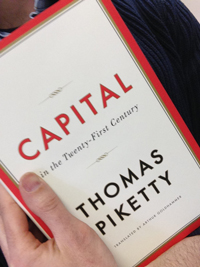Jonathan Chait (This piece is adapted from Jonathan Chait's book, The Big Con: The True Story of How Washington Got Hoodwinked and Hijacked by Crackpot Economics, which will be published on September 12 by Houghton Mifflin):
American politics has been hijacked by a tiny coterie of right-wing economic extremists, some of them ideological zealots, others merely greedy, a few of them possibly insane. The scope of their triumph is breathtaking. Over the course of the last three decades, they have moved from the right-wing fringe to the commanding heights of the national agenda. Notions that would have been laughed at a generation ago--that cutting taxes for the very rich is the best response to any and every economic circumstance or that it is perfectly appropriate to turn the most rapacious and self-interested elements of the business lobby into essentially an arm of the federal government--are now so pervasive, they barely attract any notice.
The result has been a slowmotion disaster. Income inequality has approached levels normally associated with Third World oligarchies, not healthy Western democracies. The federal government has grown so encrusted with business lobbyists that it can no longer meet the great public challenges of our time. Not even many conservative voters or intellectuals find the result congenial. Government is no smaller--it is simply more debt-ridden and more beholden to wealthy elites.
It was not always this way. A generation ago, Republican economics was relentlessly sober. Republicans concerned themselves with such ills as deficits, inflation, and excessive spending. They did not care very much about cutting taxes, and (as in the case of such GOP presidents as Herbert Hoover and Gerald Ford) they were quite willing to raise taxes in order to balance the budget. While many of them were wealthy and close to business, the leaders of business themselves had a strong sense of social responsibility that transcended their class interests. By temperament, such men were cautious rather than utopian.
Over the last three decades, however, such Republicans have passed almost completely from the scene, at least in Washington, to be replaced by, essentially, a cult.
All sects have their founding myths, many of them involving circumstances quite mundane. The cult in question generally traces its political origins to a meeting in Washington in late 1974 between Arthur Laffer, an economist; Jude Wanniski, an editorial page writer for The Wall Street Journal; and Dick Cheney, then-deputy assistant to President Ford. Wanniski, an eccentric and highly excitable man, had until the previous few years no training in economics whatsoever, but he had taken Laffer's tutelage...
Read the rest HERE

















